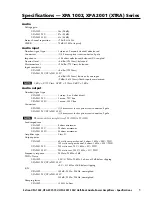
2-28
SR844 Basics
SR844 RF Lock-In Amplifier
In this illustration, the detector is measuring the signal relative to a ground far from the
rest of the experiment. The detector senses the signal plus the voltage due to the noise
source’s ground return passing through the finite resistance of the ground between the
experiment and the detector. The detector and the experiment are grounded at different
places which, in this case, are at different potentials.
Cures for ground loop problems include:
•
Grounding everything to the same physical point.
•
Using a heavy ground bus to reduce the resistance of ground connections.
•
Removing sources of large ground currents from the ground bus used for small signals.
Microphonics
Not all sources of noise are electrical in origin. Mechanical noise can be translated into
electrical noise by microphonic effects. Physical changes in the experiment or cables (due
to vibrations, for example) can result in electrical noise at the lower end of the SR844’s
operating frequency range.
For example, consider a coaxial cable connecting a detector to the lock-in. The
capacitance of the cable is a function of its geometry. Mechanical vibrations in the cable
translate into a capacitance that varies in time at the vibration frequency. Since the cable
is governed by Q = C
⋅
V. Taking the components of this equation at the vibration
frequency , we have Q
ν
= C
ν
⋅
V
0
+ C
0
⋅
V
ν
. We can also use V
ν
= R
⋅
I
ν
= j
ω
Q
ν
, where R is
the load resistance on the cable, and solve for V
ν
V
ν
=
– C
ν
⋅
V
0
/[C
0
+j/(
ω
R)]
(2-23)
This assumes a DC voltage (V
0
) present on the cable. In general a cable subject to
vibration acts as a mixer, generating signal components at the sum and difference of the
vibration frequency and any electrical signal frequency.
Some ways to minimize microphonic signals are:
•
Eliminate mechanical vibrations near the experiment.
•
Tie down cables carrying sensitive signals so they do not move.
•
Use a low noise cable that is designed to reduce microphonic effects.
Summary of Contents for SR844
Page 10: ...viii SR844 RF Lock In Amplifier...
Page 12: ...1 2 Getting Started SR844 RF Lock In Amplifier...
Page 32: ...2 2 SR844 Basics SR844 RF Lock In Amplifier...
Page 60: ...3 2 Operation SR844 RF Lock In Amplifier...
Page 102: ...3 44 Shift Functions SR844 RF Lock In Amplifier...
Page 108: ...4 6 Index of Commands SR844 RF Lock In Amplifier...
Page 144: ...4 42 Example Program SR844 RF Lock In Amplifier...
Page 146: ...5 2 Performance Tests SR844 RF Lock In Amplifier...
Page 150: ...5 6 Performance Tests SR844 RF Lock In Amplifier...
Page 156: ...5 12 Performance Tests SR844 RF Lock In Amplifier...
Page 158: ...5 14 Performance Tests SR844 RF Lock In Amplifier...
Page 162: ...5 18 Performance Tests SR844 RF Lock In Amplifier...
Page 166: ...5 22 SR844 Test Record SR844 RF Lock In Amplifier...
Page 168: ...6 2 Circuitry Parts Lists and Schematics SR844 RF Lock In Amplifier...
Page 246: ...Parts Lists SR844 RF Lock In Amplifier 6 80 Schematic Diagrams...















































